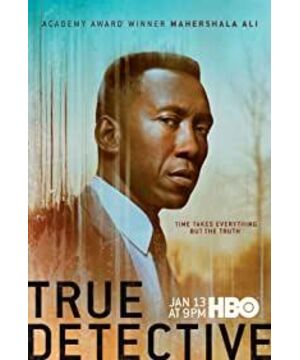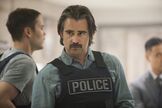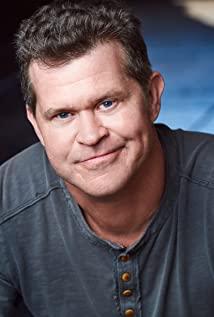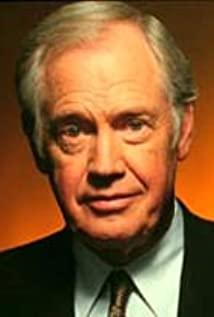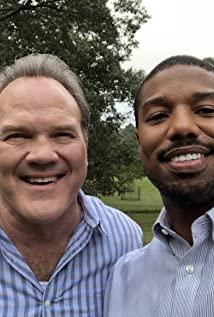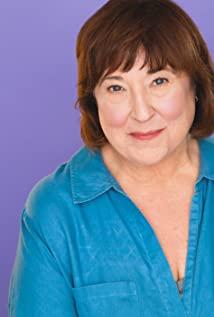Among the three seasons of "True Detective", the first season should be the best, not only because of the starring Matthew McConaughey and Woody Harrelson, but also because of the intense script of screenwriter Nick Pizzolatto. The story layout of the second season is also full of ambition, but the characters are too tragic, which weakens the cold power of the story. The third season was lackluster, and despite its dazzling narrative structure, the characters and story were pitifully thin. I think even talented playwrights have their moments of unsatisfactory performance. In any case, the series of "True Detective" series can be regarded as the TV series with the most literary expression in my shallow knowledge. Generally speaking, it is difficult to coexist TV series and literature, but Nick Pizzolatto made such an attempt with his wonderful script. In the length of 8 episodes, with interspersed narrative style, one by one The murder story becomes the detective's spiritual journey in search of themselves.
All the detectives finally found the dark wounds in their hearts and the evasive behaviors they chose because of weakness and confusion. Buddhists say that the signs are born from the heart, and they say that the reality of the objective world is the reflection projected by the heart. The bizarre cases that detectives are caught in are not reflections of their inner wounds? Look at the image of the opening song of the series, the bizarre composition, the world is in the facial contours of the operating characters, isn't this a hint that the relationship is born from the heart? Rust's grief mirrors a series of appalling cases of child sacrifice, how is Verkrue's revenge for his wife different from the revenge of the jeweler's orphan? Wasn't Bedras' abduction experience also strikingly similar to a corrupt group's large sex party? Wayne's Vietnam War trauma... well, I can't find a reason to justify it in season 3, so I think the plot of season 3 lacks the symbolism of such an internal and external echo, and is much inferior.
Symbolism may be a very important expression in True Detective, Nick Pizzolatto chose the southern swamps and overdeveloped modern towns for seasons one and two respectively, but both places have the same desolate and rundown temperament . There is irony in this. The swamp was originally wild and primitive, full of vitality, and the modern town is full of traffic and feasts, but the film repeatedly uses the camera to show a kind of desolation: empty fields, dilapidated churches, cold and twisted highways, monotonous and ugly The industrial chimneys... This kind of prosperous desolation is the reflection of the spiritual emptiness of the residents at that time and place. From this, the playwright seems to point the critical pen to the spiritual emptiness behind modern civilization. Urbanization, industrial civilization, and economies of scale have spawned greed, indulgence, and indifference, draining the wealth of a town and draining the energy of all residents, leaving an empty shell town where the residents of the town are bored to drink. , will eventually become the abyss of sin.
Most sins stem from self-loathing that comes with emptiness. Rust gets drunk and performs the most dangerous missions, Marty has an affair, Verkru is a thug for the underworld gangster, Bedras is addicted to gambling and one-night stands, Woodruff keeps evading the fact that he is gay, and the gangster gangster Semyon Trying to get ahead because of childhood trauma is ultimately a compensatory act for some kind of emptiness that cannot be dealt with. When such a sense of emptiness looms over the residents of the entire town, sooner or later, there will be a big case of a big devil. Of course, religion is an optional sustenance, but Nick Pizzolatto did not simply embrace this spiritual driftwood. In his writings, most religious organizations are just corporations in holy robes, not only participating in grabbing the wealth of the people, but also Various sacrificial ceremonies were designed to pack sin. It was Nick Pizzolatto's most daring and powerful critique, and the most compelling plot design of the first season. I don't know if it has been counterattacked too much in the United States, and the religious factor has been reduced a lot since the second season.
Beyond religious sustenance, what relief did Nick Pizzolatto finally offer? I think it's probably human nature, the brilliance in human nature, like the shining stars in the last shot of the first season, small but tenacious. What is human nature? People who watch the show are often prone to overestimating their humanity because they empathize with the protagonist's pity. Is it humane to shed a few tears of compassion in the face of a victim? Is it glorious to go through fire and water to hunt down the murderer and return the dead to justice? Is the fugitive father's temporary suggestion to see his son for the last time full of humanity? This is of course, our protagonist must first be human, and we can also understand human nature as compassion for suffering, but Nick Pizzolatto obviously has a deeper understanding, because compassion alone is no way Those who solve the case will not be able to find peace. Only when you can honestly accept yourself after facing the trauma and darkness in your heart, can you truly have humanity.
Rust has a godlike world-weary independence, his compassion is more like an attempt to approach the divine, and his pursuit of the murderer is more like an attempt to prove himself; Marty is more secular and more secular. To be more human, he can give a young prostitute a little money to make her own a living, and he will shoot the criminal to death in a fit of rage. Neither is fully human, and both have a certain self-defeating connotation. Twenty years later, Rust and Marty can accept themselves calmly, let go of their past grievances, and cooperate sincerely to solve the case. You can also say that when the demons are gone, the mystery will naturally be broken. When Rust and Marty finally entered the dark labyrinth, it was as if two faint rays of light entered the dark depths of the heart, that is the light of human nature. Although the second season lacked such a magical metaphor, both Vercrux and Vedras found the murderer after they found their past and let go of their inner obsessions. Verkrut is probably the character who best shows the contradictions of human nature. On the one hand, he was brooding about the injury he and his wife suffered, and on the other hand, he did not dare to face the consequences of this injury. It was this obsession and escapism that ruined him. When he finally fled, we knew that he could not escape. But in my heart, I hope that he can start again, which has to be said to be our trust in human nature and our hope to maintain it.
Finally, I want to talk about time. Time is a very important factor in the "True Detective" series. In the first and third seasons, the stories are arranged into three time points, and they are connected by oral means. It's a playwright's tact (season 3 was so ingenious that it ignored the story), and it's not the time I wanted to tell. What I mean is the time when the case is buried in the heap of history like a swamp that devours corpses, the time when the case can be brought out of the water step by step over time, the time when the hatred of the two orphans slowly fermented and finally burst like a pustule. That kind of time is the kind of time that allows the victim to hide away and slowly return to normal life. Similarly, it is also the kind of time that allows people to see themselves and accept themselves little by little. Time may bury everything, but the true self will not be buried, as long as you can face yourself.
View more about True Detective reviews


